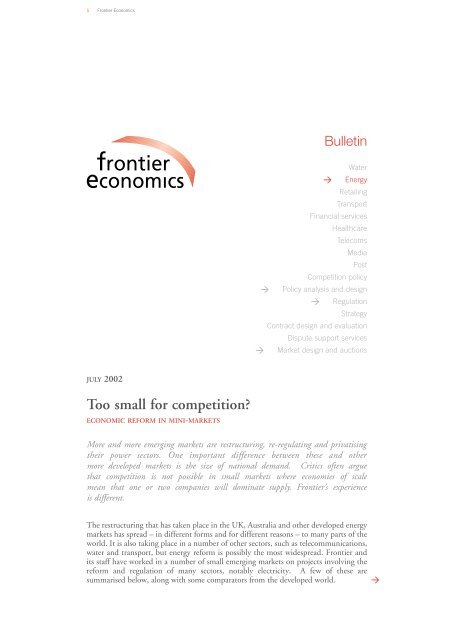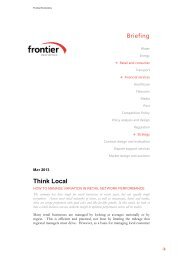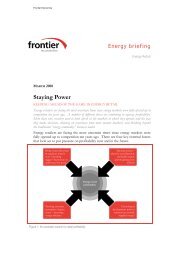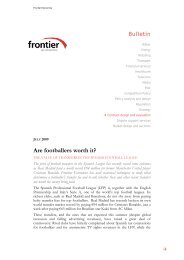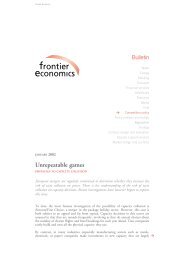too small for competition.pdf - Frontier Economics
too small for competition.pdf - Frontier Economics
too small for competition.pdf - Frontier Economics
Create successful ePaper yourself
Turn your PDF publications into a flip-book with our unique Google optimized e-Paper software.
1 <strong>Frontier</strong> <strong>Economics</strong><br />
JULY 2002<br />
Too <strong>small</strong> <strong>for</strong> <strong>competition</strong>?<br />
ECONOMIC REFORM IN MINI-MARKETS<br />
Bulletin<br />
Water<br />
> Energy<br />
Retailing<br />
Transport<br />
Financial services<br />
Healthcare<br />
Telecoms<br />
Media<br />
Post<br />
Competition policy<br />
> Policy analysis and design<br />
> Regulation<br />
Strategy<br />
Contract design and evaluation<br />
Dispute support services<br />
> Market design and auctions<br />
More and more emerging markets are restructuring, re-regulating and privatising<br />
their power sectors. One important difference between these and other<br />
more developed markets is the size of national demand. Critics often argue<br />
that <strong>competition</strong> is not possible in <strong>small</strong> markets where economies of scale<br />
mean that one or two companies will dominate supply. <strong>Frontier</strong>’s experience<br />
is different.<br />
The restructuring that has taken place in the UK, Australia and other developed energy<br />
markets has spread – in different <strong>for</strong>ms and <strong>for</strong> different reasons – to many parts of the<br />
world. It is also taking place in a number of other sectors, such as telecommunications,<br />
water and transport, but energy re<strong>for</strong>m is possibly the most widespread. <strong>Frontier</strong> and<br />
its staff have worked in a number of <strong>small</strong> emerging markets on projects involving the<br />
re<strong>for</strong>m and regulation of many sectors, notably electricity. A few of these are<br />
summarised below, along with some comparators from the developed world. >
2 <strong>Frontier</strong> <strong>Economics</strong> | July 2002<br />
Country Installed capacity<br />
(approx, MW)<br />
Cambodia 160<br />
Dominica 25<br />
El Salvador 960<br />
Guyana 180<br />
Malawi 300<br />
Uganda 270<br />
New Zealand 8,000<br />
Portugal 10,000<br />
Thailand 16,000<br />
UK 70,000<br />
Compared to countries with more developed markets, many emerging economies have<br />
low levels of installed capacity. In many cases installed capacity is less than total<br />
demand (i.e. there is rationing of electricity supply). However, total demand is still very<br />
low relative to that in more developed markets. Under these conditions it is often<br />
argued that the typical approach to re<strong>for</strong>m—breaking up the incumbent monopoly<br />
into competing generation units and regional distribution companies—will not work<br />
because:<br />
• the resulting companies will be <strong>too</strong> <strong>small</strong> and fail to benefit from economies of scale;<br />
and<br />
• new demand is rapidly exhausted and there is little switching between suppliers, so<br />
that total demand is served by one or two incumbents.<br />
Evidence from around the world suggests that well-implemented re<strong>for</strong>ms—including<br />
the introduction of <strong>competition</strong> and regulation where appropriate—benefits consumers<br />
by removing existing inefficiencies and providing clear incentives to meet demand.<br />
Many of these countries witness power shedding at peak times despite consumers being<br />
willing to pay higher prices because installed capacity cannot meet demand.<br />
Consequently, the governments of many emerging economies are looking at re<strong>for</strong>m<br />
options that include the introduction of <strong>competition</strong>. This raises the question: are<br />
some markets <strong>too</strong> <strong>small</strong> <strong>for</strong> <strong>competition</strong>?<br />
WHAT IS COMPETITION?<br />
The key to introducing effective <strong>competition</strong> in <strong>small</strong> markets lies in recognising that<br />
there are many different types of <strong>competition</strong> that can be introduced. Competition can<br />
be:<br />
• in the market - the familiar <strong>for</strong>m of <strong>competition</strong>, between companies trying to sell<br />
similar products;<br />
• <strong>for</strong> the market - <strong>competition</strong> to enter a new market which may be continuous<br />
pressure (known as contestability) or an occasional contest to enter the market, after<br />
which there is a monopoly <strong>for</strong> some period; or<br />
• comparative - a regulated <strong>for</strong>m of <strong>competition</strong> in which the prices that suppliers are<br />
allowed to charge are based on the per<strong>for</strong>mance of other regional monopolies.<br />
WHAT CAN BE DONE?<br />
When governments begin the re<strong>for</strong>m process they are often only thinking of<br />
<strong>competition</strong> in the market. This is much more difficult to implement in its classic <strong>for</strong>m<br />
in <strong>small</strong>er markets—although countries such as Uganda and El Salvador have<br />
Too <strong>small</strong> <strong>for</strong> <strong>competition</strong>?<br />
Source: <strong>Frontier</strong> <strong>Economics</strong><br />
and Energy In<strong>for</strong>mation<br />
Administration
3 <strong>Frontier</strong> <strong>Economics</strong> | July 2002<br />
attempted such an approach. However, <strong>competition</strong> in the market can be implemented<br />
through auto generation, or self-generation.<br />
Auto generation occurs when electricity consumers (often large companies or hotels)<br />
install their own generators. Advances in modern technology mean that units<br />
generating substantial amounts of electricity can be quickly and relatively cheaply<br />
installed and run on the companies’ premises. This option provides an important<br />
discipline to incumbent utilities by setting a maximum price of supply. It is vital that<br />
re<strong>for</strong>m legislation, which often provides <strong>for</strong> some measure of exclusivity, allows this<br />
<strong>for</strong>m of <strong>competition</strong> in the market.<br />
Competition <strong>for</strong> the market can also lead to many of the same pressures on<br />
per<strong>for</strong>mance and, there<strong>for</strong>e, have many of the positive effects. For example, in<br />
Cambodia the poor per<strong>for</strong>mance of the government-owned electricity company has left<br />
the door open <strong>for</strong> numerous <strong>small</strong>-scale electricity suppliers who supply <strong>small</strong><br />
communities unconnected to the national grid.<br />
There are over 200 rural electrification schemes of one sort or another. These range<br />
from private initiatives set up by entrepreneurs to meet local demand to co-operatives<br />
set up by local residents. This <strong>for</strong>m of <strong>competition</strong> <strong>for</strong> the market between <strong>small</strong><br />
companies provides incentives <strong>for</strong> the ongoing supply of electricity. Some of these<br />
markets are even contestable.<br />
A danger encountered in the re<strong>for</strong>m process is that these <strong>small</strong>-scale competitors may<br />
be eliminated by the emergence of larger, regional monopolies. Re<strong>for</strong>m and privatisation<br />
initiatives often include some element of exclusivity (e.g. a regional monopoly <strong>for</strong><br />
the privatised utility). This works to decrease existing <strong>competition</strong> and may harm<br />
consumers. Small markets often have <strong>small</strong>-scale <strong>competition</strong> and re<strong>for</strong>ms should<br />
encourage such competitors to enter the market. Panama has reached an interesting<br />
compromise under which incumbents have exclusive rights to supply within 100 metres<br />
of the existing network, beyond which supply is open to <strong>competition</strong>.<br />
The combination of these <strong>for</strong>ms of <strong>competition</strong> can be quite powerful, as the chart<br />
illustrates. However, they depend on the absence of long-term contracts that entrench<br />
exclusivity of supply.<br />
Monopoly price<br />
Price<br />
Price of auto generation<br />
Price of <strong>small</strong> scale entrants<br />
Efficient price<br />
Marginal<br />
revenue<br />
Monopoly<br />
quantity<br />
supplied<br />
Gains from<br />
allowing auto gen<br />
Quantity Quantity<br />
with auto with <strong>small</strong><br />
gen scale<br />
entry<br />
In the absence of these options, comparative <strong>competition</strong> could be introduced to<br />
provide greater incentives <strong>for</strong> efficient provision. While considerably less effective than<br />
actual <strong>competition</strong>, it is better than trying to regulate a monopoly in a vacuum.<br />
Too <strong>small</strong> <strong>for</strong> <strong>competition</strong>?<br />
Additional gains from<br />
allowing <strong>small</strong> scale entry<br />
Efficient<br />
quantity<br />
Quantity
4 <strong>Frontier</strong> <strong>Economics</strong> | July 2002<br />
In the Caribbean countries mentioned above, and many others, a single, often vertically<br />
integrated, company provides electricity to the country 1 . It is often argued that the size<br />
of the markets and limited opportunity <strong>for</strong> growth, because the islands have a <strong>small</strong><br />
population, prevents the implementation of <strong>competition</strong>. While there is strong<br />
evidence that auto generation plays an important role, even if real <strong>competition</strong> is<br />
limited comparative <strong>competition</strong> can be used to provide incentives <strong>for</strong> improved<br />
company per<strong>for</strong>mance.<br />
Many of the Caribbean islands have electricity sectors with similar structures. By<br />
comparing the utilities in a rigorous manner (e.g., through a <strong>for</strong>mal benchmarking<br />
exercise), incentives similar to those found in a competitive market can be created. The<br />
combination of allowing auto generation and comparative <strong>competition</strong> can be used to<br />
drive productivity improvements in these <strong>small</strong>er economies.<br />
Finally, ensuring competitive procurement of new services (e.g., a new generator, or a<br />
new distribution company) also helps to ensure prices reflect the cost of supply. In<br />
some countries, such as Argentina, long-term contracts are re-bid at more frequent<br />
intervals to help to ensure that the most efficient company is operating the assets.<br />
THE COSTS<br />
There are some costs to introducing <strong>competition</strong>. The short-term cost is that the<br />
privatisation of a monopoly will bring greater revenue to the government than the<br />
privatisation of a company that must compete <strong>for</strong> customers. However, this short-term<br />
gain is likely to be outweighed by the longer-term benefits of more efficient pricing.<br />
Many of the additional costs of <strong>competition</strong> (e.g. setting up the markets, drafting<br />
relevant codes) also exist under a monopoly regime but in an alternative <strong>for</strong>m (e.g.<br />
monitoring the monopoly) 2 .<br />
CUT TO SIZE<br />
The key to introducing <strong>competition</strong> into <strong>small</strong> markets is recognising there are many<br />
<strong>for</strong>ms of <strong>competition</strong>. Choosing the appropriate <strong>for</strong>m and implementing it effectively<br />
within the appropriate regulatory framework will provide lasting benefits to the<br />
residents of <strong>small</strong> countries.<br />
SOURCE<br />
CONTACT<br />
1. There are some isolated suppliers in Guyana and elsewhere.<br />
2. There may be some cost savings from a monopoly (e.g., the elimination of any<br />
need <strong>for</strong> advertising and promotions) but these are unlikely to outweigh<br />
the benefits discussed above.<br />
William Derbyshire william.derbyshire@frontier-economics.com<br />
Mike Webb michael.webb@frontier-economics.com<br />
Matthew Bell matthew.bell@frontier-economics.com<br />
<strong>Frontier</strong> <strong>Economics</strong>, 150 Holborn, London, EC1N 2NS UK<br />
BOSTON | LONDON | MELBOURNE<br />
www.frontier-economics.com


